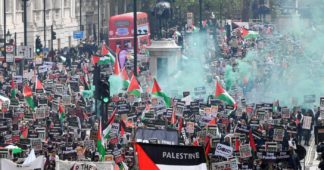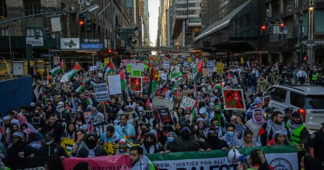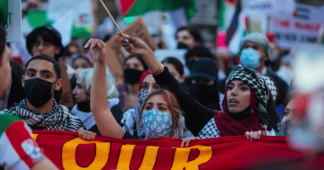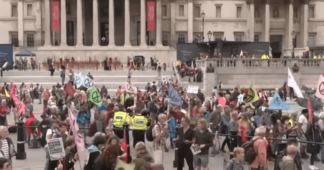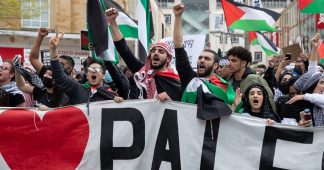In recent weeks the U.S. has seen the biggest anti-war protests since the Iraq War, but you wouldn’t know this from watching mainstream media.
From 2004 to 2010 scholars Fabio Rojas and Michael Heaney interviewed thousands of anti-war activists in order to study the interaction between political parties and social movements in the United States. In 2015 they published their findings in a book, Party in the Street: The Antiwar Movement and the Democratic Party after 9/11.
Their main argument is that the U.S. anti-war activism largely ended up overlapping with the Democratic party. While the Bush years saw a reinvigorated peace movement in response to the invasions of Afghanistan and Iraq, public protests dwindled under his successor.
Barack Obama’s opposition to the Iraq War was a central component of his campaign and the most striking difference between him and Hilary Clinton during the Democratic primary. “I was opposed to Iraq from the start,” said the future president during his campaign. “and I say that not just to look backwards, but also to look forwards, because I think what the next president has to show is the kind of judgment that will ensure that we are using our military power wisely.”
“I think I will be the Democrat who will be most effective in going up against a John McCain, or any other Republican,” he continued. “because they all want basically a continuation of George Bush’s policies, [and] because I will offer a clear contrast as somebody who never supported this war, thought it was a bad idea.”
Obama was right about his ability to beat McCain, but he certainly continued some of Bush’s policies. In fact, he expanded a number of them—dramatically stepping up the U.S. presence in Afghanistan, stretching the “War on Terror” into more of Africa, and launching a global assassination campaign in the form of a drone program. Despite these policies, very few people took to the street.
“People have to make the choice, maybe unconsciously, where they could say, ‘You know, I could keep protesting the war, but does that make Obama look bad? Is that an issue we want to avoid?’ And in the case of the antiwar movement, partisan motivations and partisan identities won the day,” Rojas told Jacobin in 2018.
Palestine protests
Since Israel began its siege on Gaza in response to Hamas’s October 7th attack, there have been massive protests across the world in solidarity with Palestine. This includes the United States, where the country has seen the largest anti-war, anti-imperialist protests since the Iraq War in 2003.
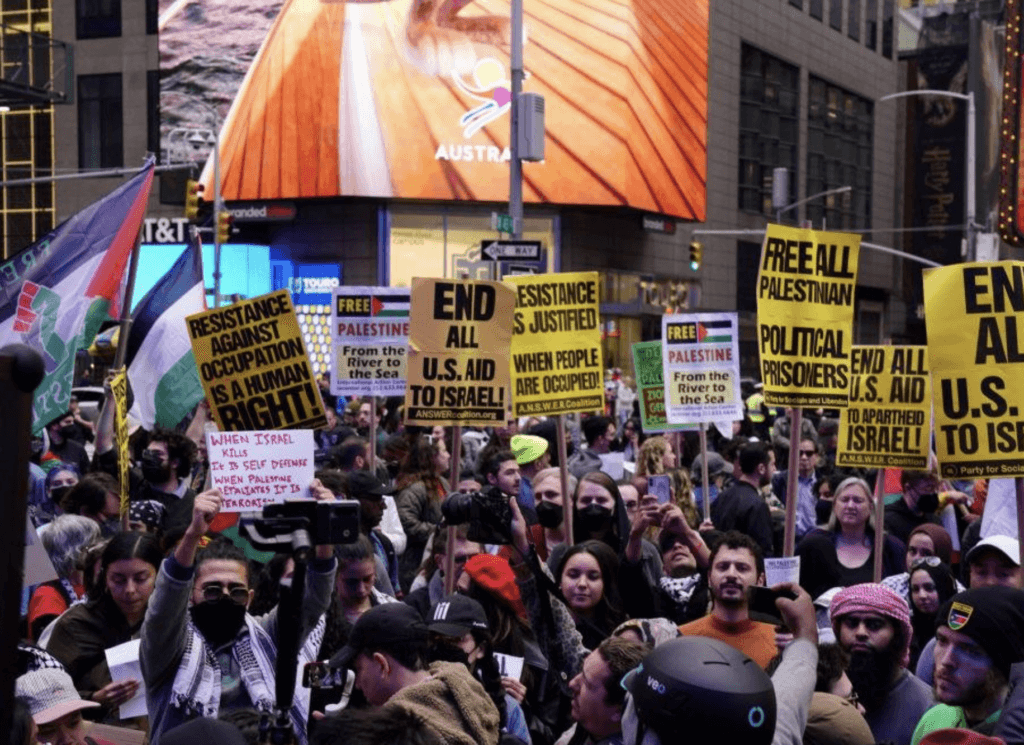
Thousands have hit the streets in NYC, Los Angeles, Washington DC, and dozens of other cities. A DC protest organized by Jewish activist groups drew thousands, and hundreds were later arrested, including two dozen Rabbis. An estimated 25,000 people showed up to a rally in Chicago. These events show no signs of stopping, with many more planned across the coming days.

These actions have gone beyond marches, with protesters showing up at the offices and homes of politicians demanding a ceasefire. Six activists were arrested at a pro-Palestine rally outside the Boston office of Senator Elizabeth Warren (D-MA). A large crowd demonstrated outside the Brooklyn home of Senator Chuck Schumer (D-NY). Jewish protesters showed up outside the Brentwood house of VP Kamala Harris. IfNotNow members have held sit-ins at the DC offices of Schumer, Senator Bernie Sanders (I-VT), Rep. Hakeem Jeffries (D-NY), and Rep. Katherine Clark (D-MA).
Former staffers for Warren, Sanders, and Senator John Fetterman have publicly urged the lawmakers to back a ceasefire.
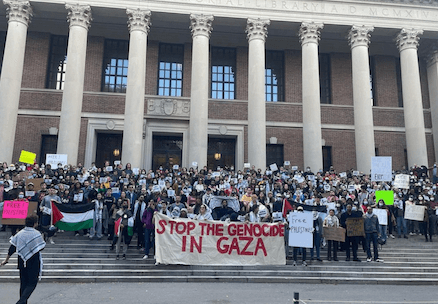
On October 25, tens of thousands of students across more than 100 North American campuses united in a walkout to demand an immediate ceasefire, an end to unconditional support for Israel, and university divestment from the corporations funding the occupation of Palestine.
On the night of October 27 Jewish activists shut down Grand Central Station, leading to the arrest of over 300 people.
“This is bigger than we’ve ever seen,” US Campaign for Palestinian Rights (USCPR) Executive Director Ahmad Abuznaid told Mondoweiss. “This is the result of decades of work that we’ve put into this movement, and I think some of it is connected to the [George Floyd protests of 2020]. There was so much racial, social justice, anti-war building in that moment.
“What I am witnessing today is folks asking the right questions, he continued. “Why am I supporting this? ‘We am I complicit in this?’ Average Americans are seeing this carnage and wondering why they are subsidizing this genocide.”
Hatem Abudayyeh lives in Chicago and is the National Chair of the U.S. Palestinian Community Network (USPCN). He told Mondoweiss that the sheer viciousness of Israel’s assault and the political establishment’s refusal to assist Palestine are major factors in driving people to protest.
“We’ve seen big protests on Palestine before,” Abudayyeh told Mondoweiss. “We saw big protests in Chicago when Israel attacked Gaza in 2009 and when they bombed Gaza in 2014. High thousands regularly, probably up to 10 or 15,000. We saw them again [when Israel attacked Gaza] in 2021. Nothing I’ve seen looks like this. These have been the biggest I have seen since the Iraq War. The scope is bigger than I’ve ever seen.”
Recent polling indicates that many Americans agree with protesters demands for a ceasefire, an indication that the organizing is having a tangible impact.
A new survey from Data for Progress found that 66% of voters “strongly agree” or “somewhat agree” that the use should call for a ceasefire and a deescalation of violence in the region. This includes 57% of Independents, 56% of Republicans, and a staggering 80% of Democrats.
Palestine and the Democratic party
Unlike the Obama-era protest dip that Rojas and Heaney tracked, this is all occurring under a Democratic administration.
Biden is even facing pushback from lawmakers within his own party. A group of progressive House members (Including Reps. Cori Bush, Rashida Tlaib, André Carson, Summer Lee, Alexandria Ocasio-Cortez, Ilhan Omar, and Ayanna Pressley) are pushing a resolution calling on the administration to embrace a ceasefire and send immediate aid to Gaza.
At the D.C. rally, Tlaib called Biden out directly. “If we don’t get back to our shared humanity, I don’t think we will ever come back from this,” she told the crowd. “And to our President: I want him to know, as a Palestinian-American and someone of Muslim faith, I’m not going to forget this. And I think a lot of people are not going to forget this.”
A new Gallup poll found that Biden’s approval has dropped 11 points among Democrats since the beginning of October, the worst numbers from his own party yet. The group’s write-up of the survey notes that Biden’s downturn comes in the wake of the October 7 Hamas attack.
“Immediately after the attack, Biden pledged ‘rock solid and unwavering’ support for Israel from the U.S., and he subsequently visited the country on Oct. 18 to reiterate that message,” it reads. “But Biden has faced criticism from some members of his party for aligning too closely with Israel and not doing enough for the Palestinians. Some prominent Democratic lawmakers and protesters around the U.S. have called for Biden to do more to help the millions of Palestinians who are in need of humanitarian aid as Israel attempts to eradicate Hamas.
“Although the survey is not designed to allow for statistically reliable estimates for any subset of the three-week polling period, the daily results strongly suggest that Democrats’ approval of Biden fell sharply in the aftermath of the Oct. 7 attacks by Hamas and Biden’s promise of full support for Israel on the same day,” it continues.
This development shouldn’t be surprising to people who have followed polling on the issue in recent years.
A 2021 Gallup survey found that, for the first time, a majority of Democrats now sympathize more with Palestinians than Israelis. A 2019 Data for Progress poll found that 65% of Democratic voters support conditioning aid to Israel. A Center for American Progress poll from that year had the number even higher, at 71%. A 2020 University of Maryland Critical Issues Poll found that 48% of Democrats who had heard of Boycott, Divestment and Sanctions (BDS) “strongly or somewhat” support the movement. A survey by the same group this year found that 44% of Democrats think Israel is an apartheid state.
Biden’s reputation is also predictably taking a hit among Arab-American voters, a compelling reason for the administration to be concerned. In 2020, 300,000 Arab-American, Democratic voters in Michigan helped push Biden to a narrow victory over Trump in the swing state.
“The man broke my heart,” Palestinian-American comedian Maysoon Zayid told Politico on October 23, “I never in my life thought the empathizer-in-chief would sound the way he did. The Palestinians were given no humanity. Joe Biden should spend every breath he has condemning Israel’s genocide with the same zeal he condemned Hamas’ massacre of civilians, that same zeal. And we get nothing. 1,000 children are dead, and we get nothing.”
“It’s really crazy to me that the Democratic party destroyed 20-years of worth of good will with Muslims and Arabs in just 2 weeks, losing an entire generation that was raised in the progressive coalition, possibly forever,” tweeted author and activist Eman Abdelhadi. “The rapidity of it, the finality–it’s astonishing.”
“While Republican disregard for Muslim and Arab lives is clearly on display, some Muslim and Arab Americans also feel like the Democratic Party largely takes their vote for granted, though Democrats’ policies never reflect as much,” writes Dana El Kurd in The Nation. “One Arab American friend expressed to me that, at least under Republican administrations, ‘Arabs could find allies’ in their opposition.”
“Whether or not liberals agree with this calculation is irrelevant,” she continues. “A growing number of people are deciding that the question of how to improve the conditions on the ground in Palestine and the wider Middle East has little to do with who is president. And this should be concerning to the administration—that is, if Biden and his team can actually absorb any of these lessons. For many Muslim and Arab Americans, they are done hoping.”
Media coverage
Many have criticized the media coverage of the current movement.
“There are huge protests everywhere in the US against genocide in Gaza, in solidarity with Palestinians and calling for not only a ceasefire but an end to US support for occupation,” tweeted author and professor Thea Riofrancos. “Yet, I haven’t seen a single article in a major newspaper about what is becoming a mass movement. First, am I missing something? Has the NYT, WaPo, etc covered this in any depth? Second, who is keeping track of the numbers? I’m seeing anecdotal reports of thousands and tens of thousands for some of these demonstrations. Is there anywhere these numbers are being compiled?”
“We know media is an arm of the U.S. government,” Abudayyeh told Mondoweiss. “It’s not independent, it’s owned by multinational corporations..they want to cover the scope of it. We legit had 25,000 at the Chicago. One of the outlets said hundreds! With the naked eye a child could see it was thousands.”
A campus organizer at the University of Massachusetts Amherst told Mondoweiss that about 300 pro-Palestine students showed up for a rally, while just 3 or 4 pro-Israel students counterprotested. “The only coverage of that event was in a student-run newspaper,” he explained. “The mainstream media is not representing what is really going on.”
The aforementioned college walkout received barely any coverage beyond student newspapers and a write-up in Teen Vogue.
In a post on Instagram the Philly Palestine Coalition criticized The Philadelphia Inquirer for failing to cover a large Palestine protest in the city but deciding to report on a much smaller pro-Israel action. “On Saturday October 21, thousands of Philadelphians took to the streets to protest the genocide and ethnic cleansing of the Palestinian people,” it read. “This was one of the largest protests in Philadelphian history, yet the [Philadelphia Inquirer] and other news agency’s gave it ZERO coverage while covering and exaggerating pro-Israeli rallies. THIS IS MEDIA SUPPRESSION. We must boycott the Inquirer and demand proper media coverage of the genocide of the Palestinian people and our acts of solidarity with the Palestinians as they resist their ethnic cleansing. SHAME ON THE INQUIRER.”
“The polls continue to show this organizing is working,” said Abuznaid. “The media is doing the best it can to slow down the efforts of the mass movement. We are seeing concerted efforts from U.S. decision-makers to stifle this conversation in a public way. That means we need to double down and keep going hard.”
We remind our readers that publication of articles on our site does not mean that we agree with what is written. Our policy is to publish anything which we consider of interest, so as to assist our readers in forming their opinions. Sometimes we even publish articles with which we totally disagree, since we believe it is important for our readers to be informed on as wide a spectrum of views as possible.
